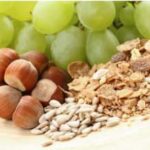 Diverticular disease occurs when pouches (diverticula) in the intestine become inflamed.
Diverticular disease occurs when pouches (diverticula) in the intestine become inflamed.
Researchers at University of Oxford, in the UK, examined the associations of a vegetarian diet and fiber intake with the risk of diverticular disease.
First, the details.
- The diets of 47,033 adults (33% consuming a vegetarian diet) were assessed.
- They were divided into 2 groups: vegetarian or meat eaters
- In the vegetarian group, intake of dietary fiber was estimated from a food frequency questionnaire.
- Cases of diverticular disease were identified using hospital records and death certificates.
And, the results.
- After about 12 years, there were 812 cases of diverticular disease (806 admissions to hospital and 6 deaths).
- After adjusting for confounding variables, vegetarians had a 31% lower risk of diverticular disease vs meat eaters.
- The probability of admission to hospital or death from diverticular disease between the ages of 50 and 70
- Meat eaters 4.4% vs 3% for vegetarians.
- Those with higher intake of dietary fiber had a significant 41% lower risk vs those with the lowest intake.
- After mutual adjustment, both a vegetarian diet and a higher intake of fiber were significantly associated with a lower risk of diverticular disease.
The bottom line?
The authors concluded, “Consuming a vegetarian diet and a high intake of dietary fiber were both associated with a lower risk of admission to hospital or death from diverticular disease.”
Patients affected by uncomplicated diverticular disease suffer from colicky, unexplained, recurrent, and short-lived but often debilitating abdominal pain and alteration in bowel habit. The goals of therapy are to improve symptoms and prevent recurrent attacks and complications. The results from this study are important because they help define the benefits of a vegetarian diet and a high intake of dietary fiber on the management of this disease.
7/21/11 20:45 JR